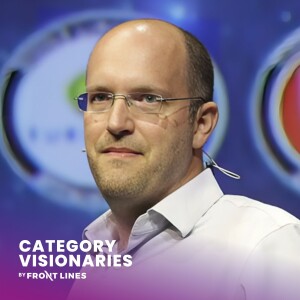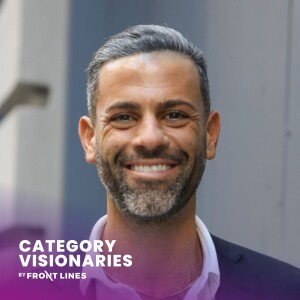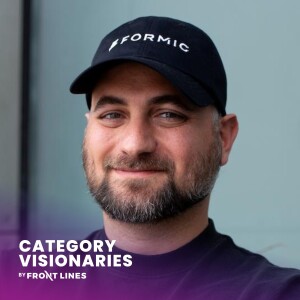BUILDERS
Welcome to BUILDERS — the show about how founders get new technology adopted.
Each episode features a founder on the front lines of bringing new tech to market, sharing how they broke into their industry, earned early believers, built credibility, and unlocked real technology adoption.
BUILDERS is part of a network of 20 industry-specific shows with a library of 1,200+ founder interviews conducted over the past three years.
For the full network, visit FrontLines.io.
Brought to you by:
www.FrontLines.io/FounderLedGrowth — Founder-led Growth as a Service. Launch your own podcast that drives thought leadership, demand, and most importantly, revenue.
Episodes

Tuesday Oct 15, 2024
Tuesday Oct 15, 2024
Welcome to another episode of Category Visionaries — the show that explores GTM stories from tech's most innovative B2B founders. In today's episode, we're speaking with Vicky Demas, CEO of Identifeye Health, a retinal imaging platform that has raised over $90 Million in funding.
Here are the most interesting points from our conversation:
Automating Retinal Imaging: Vicky explains how Identifeye Health is leveraging AI and automation to build a fully automated camera, simplifying retinal screening and addressing access to care.
Founding Journey: The company received initial funding three and a half years ago, with Vicky brought in to reset the company’s vision and direction, thanks to her expertise in AI-driven healthcare solutions from her time at Google X.
Google X Experience: Vicky shares insights into her time at Google X, where the team worked on high-impact healthcare projects using AI, including early work on retinal imaging for diabetic retinopathy.
Rebranding Challenge: Identifeye Health underwent a major rebranding exercise, turning it into an exciting team-driven initiative that created a more accurate and trademarkable brand name.
Tackling Diabetic Retinopathy: Identifeye Health is focused on improving the accessibility and accuracy of diabetic retinopathy screening, aiming to solve the issue of low patient screening compliance with AI-driven simplicity.
Pre-Commercial Stage: The company is in the final stages of commercialization, actively preparing manufacturing and quality management processes to launch their solution.
//
Sponsors:
Front Lines — We help B2B tech companies launch, manage, and grow podcasts that drive demand, awareness, and thought leadership.
www.FrontLines.io
The Global Talent Co. — We help tech startups find, vet, hire, pay, and retain amazing marketing talent that costs 50-70% less than the US & Europe.
www.GlobalTalent.co

Tuesday Oct 15, 2024
Tuesday Oct 15, 2024
Welcome to another episode of Category Visionaries — the show that explores GTM stories from tech's most innovative B2B founders. In today's episode, we're speaking with Geert Van Kerckhoven, CEO & Co-Founder of Oper, a mortgage tech platform that's raised over $15 Million in funding.
Here are the most interesting points from our conversation:
Oper’s Mission: Oper is revolutionizing the European mortgage process by digitizing the journey for both borrowers and lenders. The platform aims to improve the experience from initial contact to final contract, reducing paper-based processes and streamlining mortgage underwriting.
Founding Story: Geert's 20 years of experience in fintech and banking, combined with frustration from a personal mortgage process, inspired the creation of Oper. He saw a clear gap in the market for a modern, scalable solution for mortgage lenders across Europe.
First Customer Acquisition: Within three months of starting, Oper landed its first client who acted as a design partner, enabling the company to generate revenue from day one.
Early Challenges: While securing a first client quickly, the challenge was to avoid building a proprietary solution for just one partner. The focus shifted to scaling the product and acquiring more clients to broaden its market presence.
Go-to-Market Strategy: Oper focuses on enterprise sales with a team of experienced account executives managing relationships with banks. Additionally, they leverage partnerships with system integrators for larger, complex implementations, a key element of their growth strategy.
Marketing Strategy: Geert emphasizes the importance of content marketing. Oper creates in-depth reports and thought leadership pieces that educate the market, helping them scale their knowledge beyond face-to-face meetings.
//
Sponsors:
Front Lines — We help B2B tech companies launch, manage, and grow podcasts that drive demand, awareness, and thought leadership.
www.FrontLines.io
The Global Talent Co. — We help tech startups find, vet, hire, pay, and retain amazing marketing talent that costs 50-70% less than the US & Europe.
www.GlobalTalent.co

Tuesday Oct 15, 2024
Tuesday Oct 15, 2024
Welcome to another episode of Category Visionaries — the show that explores GTM stories from tech's most innovative B2B founders. In today's episode, we're speaking with Scott Dorey, Co-Founder of OpenPath, a payments platform that's raised $25 Million in funding.
Here are the most interesting points from our conversation:
OpenPath’s Unique Approach: OpenPath started as a middleware for merchants, helping them manage checkout processes, accept payments, and mitigate chargebacks and fraud. They’ve now evolved to offer instant direct payments using real-time bank transfers, eliminating fraud and streamlining payment processing.
Evolution of the Product: The initial idea was sparked by a co-founder’s vision. Over time, they saw an opportunity to partner with another payments company, leading to the creation of a new product—real-time, fraud-free bank transfers.
The Fraud and Chargeback Problem: Scott highlighted the pervasive issue of chargebacks in e-commerce, which can cause significant financial strain on businesses. OpenPath's solution drastically reduces these issues by simplifying and securing the payment process.
Seamless Merchant Onboarding: OpenPath has streamlined the process for merchants to integrate its technology, reducing development time and effort. This has enabled even large-scale merchants, like Lululemon, to quickly adopt their platform.
Strategic Sales and GTM Execution: OpenPath built a robust sales pipeline well before their product was fully deployed. By dividing sales into industry verticals, they ensured the product reached the right decision-makers from the start.
Future Expansion Plans: While OpenPath is currently focused on the U.S. market, with all regulatory approvals in place, Scott shared their plans to expand into Europe in the near future, where regulations are slightly more relaxed, making it an easier market to enter.
//
Sponsors:
Front Lines — We help B2B tech companies launch, manage, and grow podcasts that drive demand, awareness, and thought leadership.
www.FrontLines.io
The Global Talent Co. — We help tech startups find, vet, hire, pay, and retain amazing marketing talent that costs 50-70% less than the US & Europe.
www.GlobalTalent.co

Friday Oct 11, 2024
Friday Oct 11, 2024
Welcome to another episode of Category Visionaries — the show that explores GTM stories from tech's most innovative B2B founders. In today's episode, we're speaking with Yariv Bash, Co-Founder & CEO of Flytrex, a drone delivery platform that has raised $60 Million in funding.
Here are the most interesting points from our conversation:
Space to Drones: Yariv’s journey from leading a lunar mission to co-founding Flytrex, transitioning from spacecraft to drone delivery.
Tech Innovation: Flytrex’s unique approach to ensuring food remains fresh during delivery, using straight-line flight paths for speed and efficiency.
Overcoming Regulations: Yariv’s insights into navigating FAA regulations for commercial drone delivery in the U.S. and how they're at the final stage of approval.
Logistical Efficiency: Flytrex’s ability to hire part-time employees with benefits, distinguishing them from competitors that rely on gig workers.
Competing Lean: Flytrex’s strategy for competing against billion-dollar companies by maintaining a lean, efficient business model from day one.
Expanding Beyond Food: Yariv’s vision of scaling Flytrex to deliver not just food but also retail goods like clothing and electronics in under 10 minutes.
//
Sponsors:
Front Lines — We help B2B tech companies launch, manage, and grow podcasts that drive demand, awareness, and thought leadership.
www.FrontLines.io
The Global Talent Co. — We help tech startups find, vet, hire, pay, and retain amazing marketing talent that costs 50-70% less than the US & Europe.
www.GlobalTalent.co

Thursday Oct 10, 2024
Thursday Oct 10, 2024
Welcome to another episode of Category Visionaries — the show that explores GTM stories from tech's most innovative B2B founders. In today's episode, we're speaking with Ryan Alshak, CEO & Founder of Laurel, a Gen AI timekeeping platform that has raised $55.7 Million in funding.
Here are the most interesting points from our conversation:
Laurel's Core Offering: Laurel automates timekeeping for professional service firms like law, accounting, and consulting. By shifting from manual to AI-driven time tracking, Laurel helps users save time and ensures companies bill and collect for all work performed, boosting profits by 4-11%.
The "Aha" Moment: Ryan's inspiration to create Laurel came from his own frustrations as a lawyer, where tracking time in six-minute increments felt dehumanizing and inefficient. He realized a machine should be reminding professionals of their work, not the other way around.
Overcoming Enterprise Resistance: Ryan emphasized that competing with large incumbents in the enterprise space requires not just great technology but also building trust and social proof to overcome buyers' fear of adopting new solutions.
Change Management & Flexibility: Initially, Laurel tried to force users into a new workflow. They pivoted to offer multiple ways to track time—manually, through automation, with timers, or via delegation—meeting users where they are to drive adoption.
Importance of First Principles in AI: Ryan believes incumbents are struggling to adapt to AI because they’re retrofitting it into legacy systems. Building AI-first, Laurel delivers a superior user experience, which Ryan sees as critical to winning in the AI space.
Founder-Led Sales to 8-Figure ARR: Laurel’s journey to $10 million ARR has been driven by a founder-led sales approach, with a small but focused team. Ryan emphasized the unique learning advantages this approach provides, enabling faster product iteration and market fit.
//
Sponsors:
Front Lines — We help B2B tech companies launch, manage, and grow podcasts that drive demand, awareness, and thought leadership.
www.FrontLines.io
The Global Talent Co. — We help tech startups find, vet, hire, pay, and retain amazing marketing talent that costs 50-70% less than the US & Europe.
www.GlobalTalent.co

Wednesday Oct 09, 2024
Wednesday Oct 09, 2024
Welcome to another episode of Category Visionaries — the show that explores GTM stories from tech's most innovative B2B founders. In today's episode, we're speaking with Pulkit Agrawal, CEO & Co-Founder of Chameleon, a product adoption platform that has raised $15 Million in funding.
Here are the most interesting points from our conversation:
The Power of Onboarding: Pulkit shared how Chameleon was born from a personal experience with user onboarding, and how a simple project to revamp onboarding boosted user retention significantly.
Evolution of Positioning: Initially focused on user onboarding, Chameleon later embraced the broader category of product adoption platforms, inspired in part by market trends and competitive positioning.
Category Challenges: Pulkit discussed the struggle of accepting and operating within an existing category, like "Digital Adoption Platforms," and how Chameleon aims to differentiate itself while playing in that space.
PLG Misconceptions: Many companies fail with product-led growth (PLG) because they think of it as an all-or-nothing shift. Pulkit emphasizes the importance of small, iterative changes and learning from current users for PLG success.
Sophisticated Sales Process: Pulkit highlighted the shift from convincing companies to adopt new tools to winning customers over from competitors, which requires a more sophisticated sales process and depth of product knowledge.
Content-Led Growth: Pulkit underscored the value of high-quality content in driving inbound growth and how he has taken a hands-on approach to produce valuable, expert-level material, like a comprehensive guide on Digital Adoption Platforms.
//
Sponsors:
Front Lines — We help B2B tech companies launch, manage, and grow podcasts that drive demand, awareness, and thought leadership.
www.FrontLines.io
The Global Talent Co. — We help tech startups find, vet, hire, pay, and retain amazing marketing talent that costs 50-70% less than the US & Europe.
www.GlobalTalent.co

Tuesday Oct 08, 2024
Tuesday Oct 08, 2024
Welcome to another episode of Category Visionaries — the show that explores GTM stories from tech's most innovative B2B founders. In today's episode, we're speaking with Saman Farid, CEO & Founder of Formic, a robotics platform that has raised over $60 Million in funding.
Here are the most interesting points from our conversation:
On-demand robot workforce: Formic provides factories with robots that can work on an hourly basis, aiming to solve labor shortages by making robotic solutions more accessible.
COVID and labor shortages: Saman founded Formic during the pandemic, driven by supply chain disruptions and the unfilled jobs crisis in manufacturing, which showed a need for better automation solutions.
From VC to founder: Saman transitioned back to being a founder because he believed in the massive potential of robotics. He saw a $10 billion opportunity in automating manufacturing tasks and felt compelled to take the leap.
Robustness over cutting-edge tech: Formic focuses on reliability, prioritizing proven, dependable robotics technology that can run two shifts daily without downtime, over pursuing the latest but less mature advancements.
Unique business model - "Pay for Productivity": Formic guarantees performance and productivity, only charging clients for the output they get, which has been a game-changer in driving faster adoption of robotics.
Scaling with $250M in financing: Formic uses a sophisticated capital stack to finance deployments, which allows them to offer a "try before you buy" model, making robotics more affordable and less risky for manufacturers.
//
Sponsors:
Front Lines — We help B2B tech companies launch, manage, and grow podcasts that drive demand, awareness, and thought leadership.
www.FrontLines.io
The Global Talent Co. — We help tech startups find, vet, hire, pay, and retain amazing marketing talent that costs 50-70% less than the US & Europe.
www.GlobalTalent.co

Tuesday Oct 08, 2024
Tuesday Oct 08, 2024
Welcome to another episode of Category Visionaries — the show that explores GTM stories from tech's most innovative B2B founders. In today's episode, we're speaking with Avi Singer, CEO & Founder of Showd.me, a compliance training platform that has raised $4.5 Million in funding.
Here are the most interesting points from our conversation:
Pivoting to Compliance Training: Initially, Showd.me focused on peer-to-peer learning, but Avi pivoted the business to online compliance training in 2016 after realizing the compliance industry had a consistent, recurring need that wasn’t being addressed well.
Moving from ‘Nice to Have’ to ‘Need to Have’: Avi strategically shifted from the "nice-to-have" social learning market to the "need-to-have" compliance space, ensuring a steady demand due to regulatory requirements.
Capturing Existing Demand: Avi shared how Showd.me doesn’t need to create demand, as compliance is mandatory. Their focus is on providing a better product and understanding customer pain points to differentiate from competitors.
Bootstrapping vs. Raising Capital: Avi has largely bootstrapped Showd.me, appreciating the flexibility it offers in building a sustainable business without the pressures of constant fundraising.
Client Referrals as a Key Growth Strategy: Rather than relying heavily on outbound marketing, Avi emphasized the importance of client referrals and maintaining strong relationships with existing customers, which have been a primary driver of growth.
Scaling with Fundamentals in Place: Avi expressed his focus on scaling Showd.me without compromising the quality of the product or the company culture, emphasizing that a strong foundation is key to long-term success.
//
Sponsors:
Front Lines — We help B2B tech companies launch, manage, and grow podcasts that drive demand, awareness, and thought leadership.
www.FrontLines.io
The Global Talent Co. — We help tech startups find, vet, hire, pay, and retain amazing marketing talent that costs 50-70% less than the US & Europe.
www.GlobalTalent.co

Monday Oct 07, 2024
Monday Oct 07, 2024
Welcome to another episode of Category Visionaries — the show that explores GTM stories from tech's most innovative B2B founders. In today's episode, we're speaking with Henry O'Connell, CEO & Founder of Canary Speech, a healthcare technology company that has raised $26 Million in funding.
Here are the most interesting points from our conversation:
Origins at a Bagel Shop: Canary Speech started when Henry and Jeff Adams, the lead developer behind Amazon Echo, met and discussed the future of using voice to detect diseases. This meeting laid the foundation for Canary's vocal biomarker technology.
Incredible Speed and Accuracy: The company's AI-driven platform analyzes 40 seconds of voice data, delivering results in milliseconds with 93-96% accuracy for diseases like Alzheimer’s, mild cognitive impairment, and Parkinson’s. It’s revolutionizing early diagnosis.
Real-time Patient Insights: Canary Speech enables doctors to assess multiple conditions — from neurological diseases to anxiety and depression — during a live conversation. This allows for more comprehensive care without additional time-consuming tests.
Global Reach and Language Capabilities: Canary Speech’s models are already being used in multiple countries and languages, including English, Japanese, and Spanish, extending healthcare accessibility to underserved regions.
Strategic Partnerships with Microsoft: Microsoft’s investment and integration of Canary Speech into the Azure platform have expanded the company's reach globally. They’re now exploring partnerships that could further embed Canary’s solutions into healthcare systems.
The Transition to SaaS: After two years of project-based revenue, Canary Speech transitioned into a SaaS model, allowing for recurring revenue streams and long-term scalability in healthcare and call centers.
//
Sponsors:
Front Lines — We help B2B tech companies launch, manage, and grow podcasts that drive demand, awareness, and thought leadership.
www.FrontLines.io
The Global Talent Co. — We help tech startups find, vet, hire, pay, and retain amazing marketing talent that costs 50-70% less than the US & Europe.
www.GlobalTalent.co

Thursday Oct 03, 2024
Thursday Oct 03, 2024
Welcome to another episode of Category Visionaries — the show that explores GTM stories from tech's most innovative B2B founders. In today's episode, we're speaking with Katy Carrigan, CEO of Goody, a corporate gifting platform that's raised over $32 Million in funding.
Here are the most interesting points from our conversation:
Modernizing Corporate Gifting: Goody is transforming the outdated corporate gifting model by curating a marketplace of items people actually want, moving away from generic fruit baskets and other uninspiring gifts.
Product-Led Growth Strategy: Goody's go-to-market approach is rooted in product-led growth, with a focus on inbound sales driven by SEO, SEM, and word-of-mouth, rather than a large outbound sales team.
Pivot from Consumer to B2B: Initially launched as a consumer gifting app, Goody shifted to B2B after realizing its product was being used in business contexts. The team capitalized on this by focusing on executive assistants who handle company gifting.
Targeted Growth Through Communities: Katy shared Goody's strategy of penetrating niche buyer groups like executive assistants, HR teams, and marketing departments to drive growth within companies, using customer feedback to guide expansion.
High Conversion Rates Through Constant A/B Testing: Katy emphasized the importance of conversion optimization through rigorous A/B testing on marketing pages and user experience to drive sign-ups.
The Power of Referrals: Goody introduced a successful referral program that contributed significantly to user growth, highlighting how key user moments—like the completion of a gift—can trigger referrals.
//
Sponsors:
Front Lines — We help B2B tech companies launch, manage, and grow podcasts that drive demand, awareness, and thought leadership.
www.FrontLines.io
The Global Talent Co. — We help tech startups find, vet, hire, pay, and retain amazing marketing talent that costs 50-70% less than the US & Europe.
www.GlobalTalent.co


